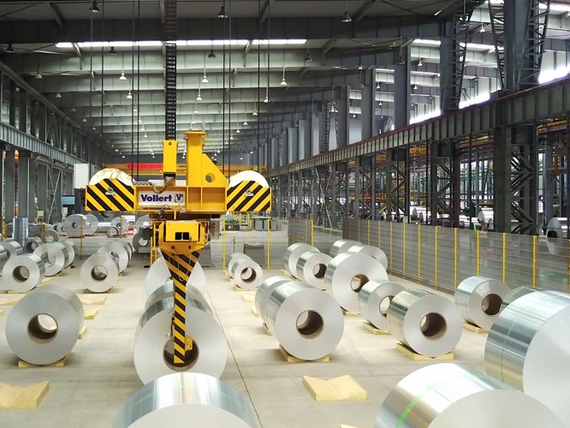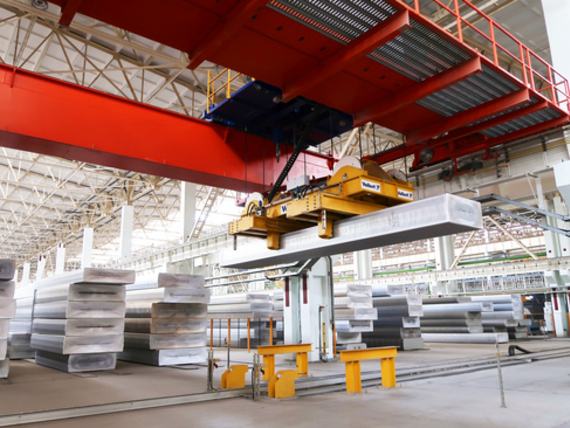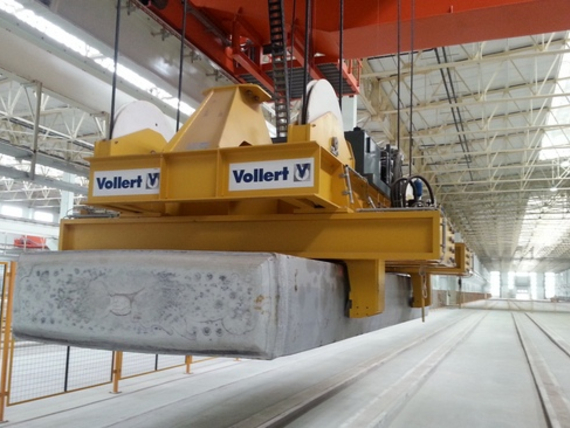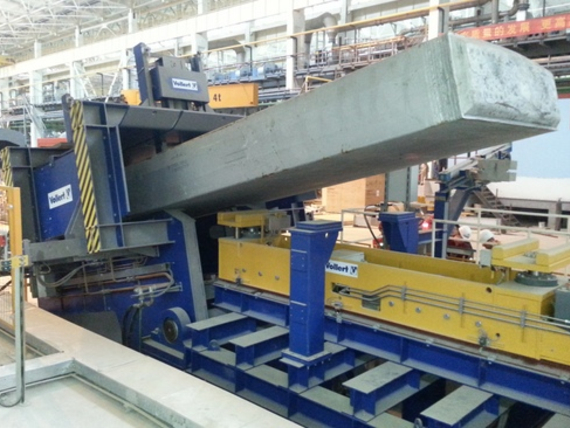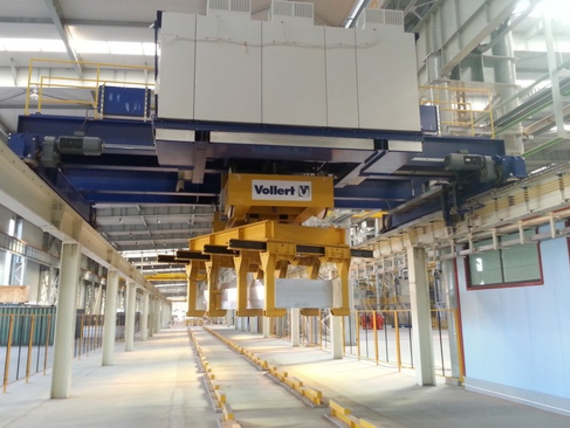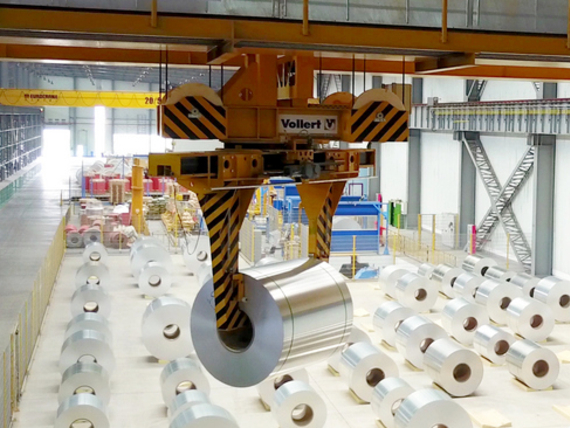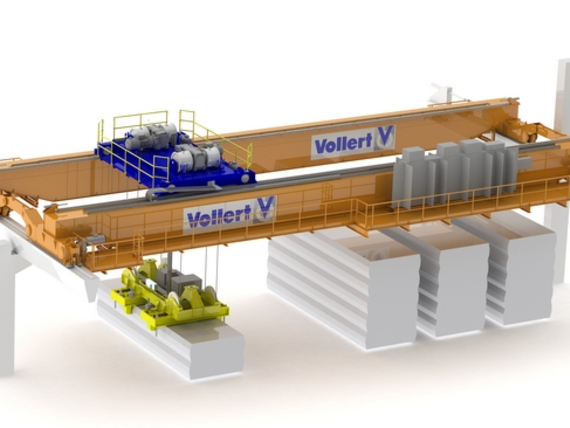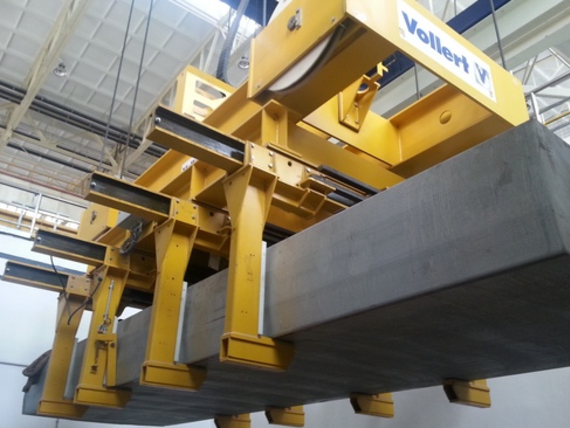The Chinese Zhongwang Group is among the world's largest producers of high-grade aluminium products. The company is planning to triple its annual production from the current one million tons of aluminium to 2.8 million tons by 2018. Aluminium has a range of applications including uses in the aircraft industry and the production of cans for packaging. In the harbour town of Tianjin, 130 km south east of Beijing, there are currently two completely new mega-aluminium rolling plants for hard and soft aluminium alloys. A third rolling plant for foil products is in the pre-planning phase. With a total area of over 5.5 km², the dimensions are impressive. The company relies on Vollert's know-how for intelligent storage systems and fully automated material flow systems. For many years, the heavy load experts have specialised in turnkey intralogistics concepts in the metal and aluminium industry. However, the dimensions in Tianjin present challenges that even they do not see every day.
Complete integrating
Zhongwang have decided to install a fully automated material flow system to ensure damage-free transportation of the sensitive ingots and aluminium coils throughout the complete material flow from the melt, through the rolling mills and on to the loading. In sites 1 and 2, 16 automatic cranes and manipulators serve several flat warehouses and interlink the site processing areas with craneway lengths up to 500 metres and with spans of up to 31.5 metres. "We are putting all of our knowledge to use connecting areas in the Tianjin plant", explains Vollert's vice-president Oliver Wolschinski. "The spectrum of technologies used here ranges from automatic cranes for ingots and coils to various transport systems, such as lift trucks, shuttles, roller conveyors, stacker cranes, and automatic measuring and identification systems to ensure a continuous, error-free material flow. The high-bay coil warehouse with a new type of individual bay cooling is also supplied by Vollert." According to the Chinese partners, the experts from Weinsberg won the contract due to their technological lead in the marketplace.
Securely stacking uneven ingots
Site 1 (hard alloy), where aluminium sheets are manufactured for the automotive industry, encompasses an area of 2 km2. Automatic cranes (AMC) serve several flat warehouses and also form the linking technology between stress relieving furnaces, high-bay warehouses and further machining and manufacturing processes. The approx. 120 x 500 m large casthouse marks the beginning. It accommodates eight casting cells and three flat storage areas for aluminium ingots. A further AMC serves to load and unload a stress relieving furnace.
The cranes are designed as 2-beam gantry cranes with spans up to 27.5 m. Their track is up to 300 m in length depending on the length of the respective flat store. Thus a total of 2,160 storage positions can be reached in site 1. After the casting process, the ingots, which are up to 35 tons in weight and approx. 9 x 3 m in size, are centered by ingot tilting stations from Vollert, fastened in place, measured, marked and set down horizontally on a lifting truck, ready for handover to the crane. The automatic cranes stack and unstack the heavy weights fully automatically - up to five ingots on top of each other. A particular challenge as the raw goods have different thicknesses along the longitudinal sides after melting as a result of manufacturing factors. The intelligent hoists on the manipulators therefore adapt the running of the four crane cables accordingly and guarantee that the materials are set down gently and stored safely. They have special ingot grippers for this: Four gripper jaws take the slabs sideways into the claws and then close with hydraulic pressure to hold the 35 ton ingots securely. A wedge on the gripper jaws ensures that the grip is secure. Pressure monitoring enables the ingots to be picked up as soon as the stipulated holding pressure has been reached. Whilst moving, the control system prevents the gripper opening unintentionally and in emergency situations a pressure accumulator ensures the ingots are held securely for a minimum of 2 hours even without the electrical power supply. The ingots can then be safely lowered via connections to the emergency power supply. However, internal tests have shown that the system even works reliably without any pressure loss up to 24 hours later, in the event of a power failure.
Unbelievably fast and very precise
High driving speeds along with high positioning accuracy are required due to the expansive flat store. For this reason, the automatic cranes in the Zhongwang cast house move at 4 m/s, around 14 km/h - so, around four times walking speed. "With these sizes of load, this is a real challenge. Normal hall cranes move at 1 m/s. Our comprehensive project experience was a great help here", explains Oliver Wolschinski. With other projects too, the engineers were presented with the task of quickly accelerating large loads. The ingots are completely lifted up before movement starts in order to prevent the load vibrating during the speedy transport.
Despite the expansive flat store, the positioning accuracy is +/- 3 mm. A laser-controlled 2-way measurement system on both sides of the AMC assists with this. It controls the left and right travel path in realtime and implements compensation measures if required. This ensures that the cranes are always exactly perpendicular to the running track, even with large spans. The synchronised running control prevents the AMC twisting thus enhancing the service life of the running rails, running gear and chassis. Vollert uses non-wearing radiating cables for data transfer. This has the advantage of a secure data transfer without WLAN. The range of the control signals is from an arbitrary length of radiating cable directly to the automatic crane's on-board antenna - with an interference-free transmission range of 120 mm.
Handling with velvet gloves
After the cooling, the raw aluminium ingots are handed over from the flat stores to a manufacturing line for sawing and milling. At the end of this line is another automatic crane, the so-called scalping manipulator. This takes the ingots that are prepared for rolling and passes them on to a tunnel shuttle for further transport into the hot rolling mill. Because it is no longer permitted for the surface of the ingot to be damaged by gripper marks, particularly gentle handling by the gripper is required. It lifts the ingots gently from the bottom, which is now possible as they no longer need to be stacked. This prevents any damage. In addition, the crane turns the ingots through 90° after lifting them before it sets them down on the tunnel shuttle for transport into the hot rolling mill. Aluminium coils or sheets are made from the ingots.
More cold-rolling processes follow after intermediate buffering and cooling of the coils, which are still over 350°, in a mega high-bay warehouse with 1,162 storage bays and an active cooling system. Another coil manipulator from Vollert feeds the coils between the rolling processes to the post heat treatment unit and the tempering furnace. This is likewise designed as a 2-beam gantry crane with a span of 16 m and is responsible for the loading and unloading of the oven. After that, the 26 ton coils are very hot and their diameter varies depending on the product and the number of rolling processes. Heat-resistant painting protects the AMC from damage. The automatic coil eye detection protects the coils by ensuring that the gripper is safely inserted into the reel. At the end of the production there is another flat store with one more automatic crane. From here the finished aluminium coils are passed on for packaging and shipping.
Highest flexibility for individual workpieces
"This project concerns not only the rapid transport of heavy loads, but first and foremost flexibly adjustable load-bearing devices that can adapt individually to the variable sizes of the workpieces", explains Oliver Wolschinski. So, the width of the ingots varies just as the circumference and width of the coils. In the end products area the range can actually vary between 1 m and 2 m. In the course of the production, the coils also change between metal coils and cardboard tubes and so the gripper must work in a correspondingly sensitive and precise manner. Nonetheless, the complete automation provides the greatest protection from damage according to the Vollert experts: "The automatic cranes in the Zhongwang plants in Tianjin ensure a smooth and rapid connection of the different rolling mills and production areas - even over large distances. This enables the control to be implemented safely and reliably round-the-clock - fully automatically. And, if necessary, we also let it work with velvet gloves."
High-bay warehouses for 100,000 tonnes of aluminium coils
China's Zhongwang Group is building three new fully automated mega aluminium plants simultaneously at its rolling plant in Tianjin. The company relies on logistically optimised material flow and storage processes together with Vollert's know-how from Germany. The longest high-bay warehouse is over half a kilometre in length and with 150 aisles and five floors, this alone will provide storage space for 1,500 aluminium coils. Two further high-bay warehouse which are being constructed at the moment will provide a further 1,100 and 2,200 storage bays. Altogether, the complete capacity will be over 100,000 tons of aluminium coils. A comprehensive material flow system - from the ingot melting though to the loading of the finished rolled product - is integrated into the store as a production buffer. The equipment delivered by Vollert for this project includes ingot tipping stations, 16 automatic cranes as well as manipulators with spans up to 31.5 m. In addition, there are crane tracks up to 500 m in length, tunnel shuttles, driverless transport systems, rack stacker cranes and 15 sword-style lift-truck pairs. All transport systems move in the high speed range at up to 4 m/s.

